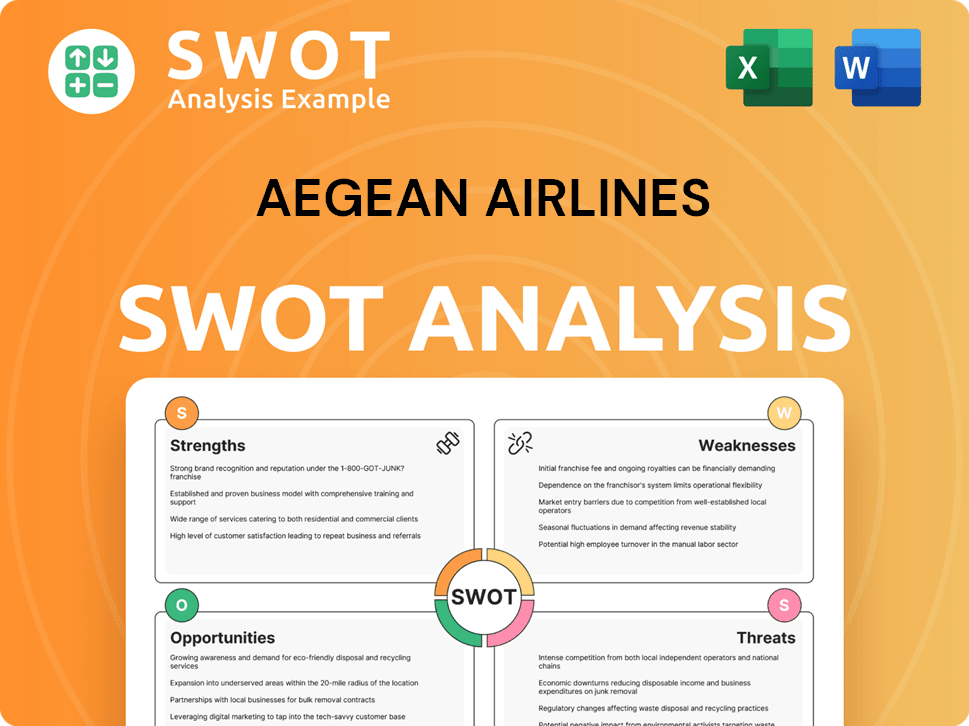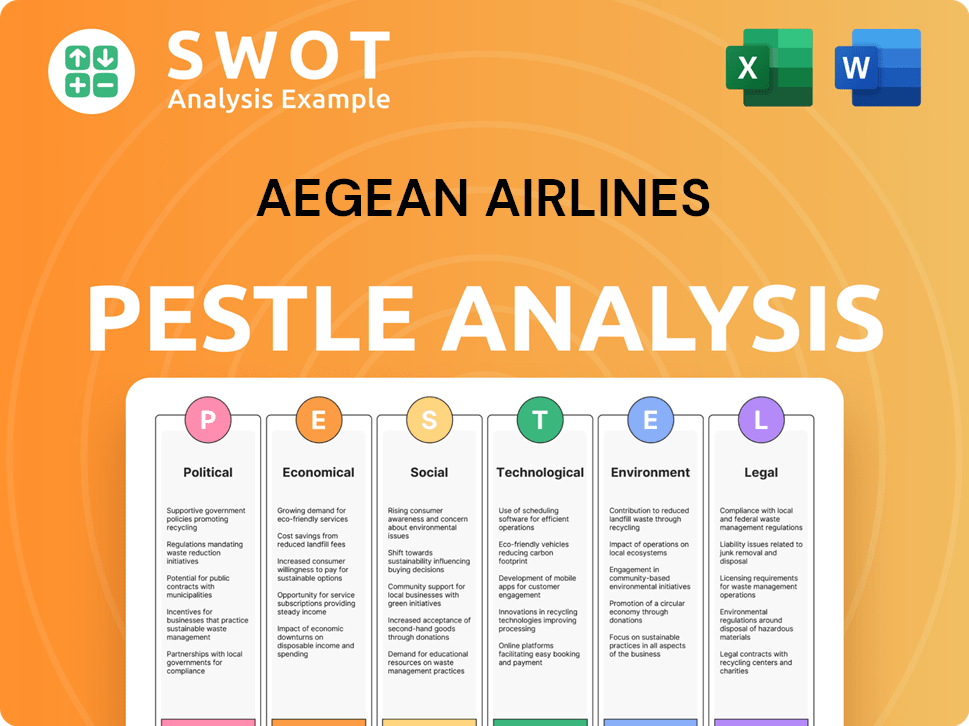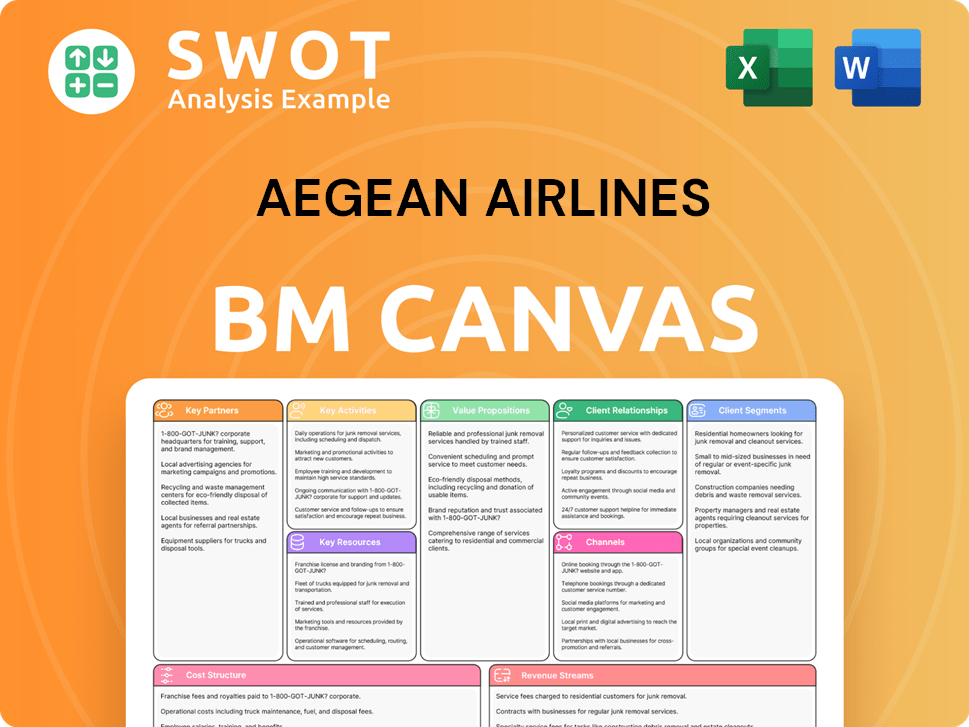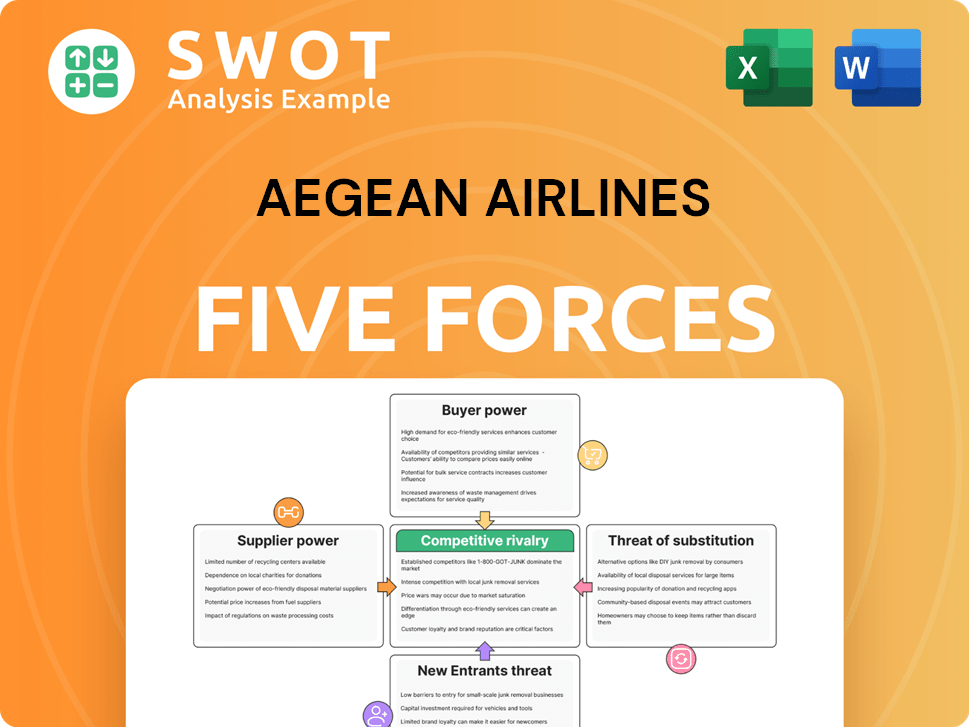Aegean Airlines Bundle
How Does Aegean Airlines Soar in the Aviation Market?
Aegean Airlines, the leading Greek airline, is more than just a carrier; it's a vital link connecting Greece to the world. With ambitious expansions and a strong post-pandemic recovery, the airline's strategic moves are crucial for understanding its financial health and growth potential. This analysis dives deep into the Aegean Airlines SWOT Analysis, exploring its core operations and revenue streams.

From its extensive flight services and route network to its ability to navigate a competitive landscape, understanding the Aegean Airlines business model is key. This in-depth look at the Greek airline will uncover the secrets behind its success, offering valuable insights for investors, customers, and industry observers alike. Discover how Aegean Airlines operations drive profitability and shape its future in the dynamic aviation sector.
What Are the Key Operations Driving Aegean Airlines’s Success?
The core of the Aegean Airlines business model revolves around providing scheduled and charter air transport services. This includes passenger flights, cargo transport, and various ancillary services. The company focuses on connecting Greece with a wide array of domestic and international destinations, catering to a diverse customer base.
The airline's value proposition lies in offering a comprehensive travel experience. This is achieved through increased connectivity, a modern fleet, and a loyalty program. These elements contribute to a differentiated travel experience within the competitive European aviation market. The airline serves a broad customer base, ranging from leisure travelers and tourists to business passengers and cargo clients.
Aegean Airlines operations are underpinned by a modern fleet, including Airbus A320neo and A321neo aircraft. In 2024, the fleet consisted of 76 aircraft. Its network spans 155 destinations in 47 countries, demonstrating a significant reach and connectivity. The airline's core capabilities translate into customer benefits through increased connectivity, a modern fleet, and a comprehensive loyalty program.
Aegean Airlines operates a modern fleet to ensure efficiency and passenger comfort. The fleet includes Airbus A320neo and A321neo aircraft. The airline's network is extensive, covering 155 destinations across 47 countries.
Customer service is a key component of Aegean Airlines' operations. The airline provides various services, including baggage handling and in-flight catering. Customer service is available through multiple channels, including phone, email, and online platforms.
Aegean Airlines offers various ancillary services to enhance the passenger experience. These include baggage handling, in-flight catering, and seat selection options. These services generate additional revenue and improve customer satisfaction.
The loyalty program is a significant part of Aegean Airlines' strategy. It rewards frequent flyers with various benefits. These benefits can include free flights, upgrades, and other perks, encouraging customer retention.
Aegean Airlines' operational effectiveness stems from its focus on expanding capacity and network, especially in key markets like Athens and Thessaloniki. The airline's operations are supported by strategic partnerships and a modern fleet. The airline's supply chain involves strategic partnerships with airports, ground handling companies, and maintenance providers.
- Route Network: Extensive domestic and international routes.
- Fleet Management: Efficient management of a modern fleet.
- Ground Services: Comprehensive ground services to support operations.
- Distribution: Online booking platforms, travel agencies, and direct sales channels.
Aegean Airlines SWOT Analysis
- Complete SWOT Breakdown
- Fully Customizable
- Editable in Excel & Word
- Professional Formatting
- Investor-Ready Format

How Does Aegean Airlines Make Money?
The primary revenue streams for Aegean Airlines stem from its core business of providing flight services. As a Greek airline, it generates most of its income through passenger ticket sales for both scheduled and charter flights. The airline's business model is heavily reliant on these sales, which constitute the largest portion of its financial intake.
In addition to ticket sales, Aegean Airlines leverages several ancillary services to boost its revenue. These include fees for baggage handling, seat selection, and in-flight services, all of which contribute to the airline's overall financial performance. The company's strategy focuses on optimizing its flight operations and enhancing the passenger experience to maximize revenue.
Aegean Airlines also operates a loyalty program, Miles+Bonus, which likely contributes to revenue through partnerships and member engagement. Furthermore, cargo services represent another revenue stream, albeit a smaller one compared to passenger operations. The airline's strategy often involves optimizing its route network and capacity to maximize passenger load factors and yield, thereby enhancing revenue per available seat kilometer.
Aegean Airlines' revenue streams are diversified, but the majority comes from passenger ticket sales. In 2023, the company reported a net profit of €169.5 million, showcasing its strong financial health. Further diversification includes ancillary services and cargo operations.
- Passenger Ticket Sales: The primary source of income for Aegean Airlines, covering both scheduled and charter flights.
- Ancillary Services: Fees from baggage, seat selection, and in-flight catering contribute to revenue.
- Loyalty Program: Miles+Bonus generates revenue through partnerships and member activities.
- Cargo Services: A smaller revenue stream compared to passenger operations.
Aegean Airlines PESTLE Analysis
- Covers All 6 PESTLE Categories
- No Research Needed – Save Hours of Work
- Built by Experts, Trusted by Consultants
- Instant Download, Ready to Use
- 100% Editable, Fully Customizable

Which Strategic Decisions Have Shaped Aegean Airlines’s Business Model?
Aegean Airlines, a prominent Greek airline, has achieved several key milestones that have significantly shaped its Aegean Airlines operations and financial performance. Its strategic moves, particularly in fleet modernization and expansion, have been pivotal. The airline's ability to adapt to market challenges, including the global pandemic, demonstrates its resilience and strategic foresight.
One of the most significant strategic moves for Aegean Airlines has been its continuous fleet modernization and expansion. This has included the introduction of new Airbus A320neo and A321neo aircraft. This not only improves operational efficiency through better fuel consumption but also increases capacity and expands the route network. In 2024, the airline planned to operate with 76 aircraft, offering 18.7 million seats, reflecting a clear focus on growth and capacity enhancement.
The airline's competitive edge is rooted in its strong brand presence as Greece's largest airline and its extensive network of domestic and international routes. Aegean Airlines also benefits from economies of scale within the Greek market and its strategic position as a gateway to Southeastern Europe. The company continues to adapt to new trends by investing in its fleet and expanding its network, aiming to maintain its competitive edge in a dynamic aviation landscape. For more information about their expansion, you can read about the Growth Strategy of Aegean Airlines.
Aegean Airlines has consistently expanded its fleet and route network. The airline has also successfully navigated economic downturns and global crises. These milestones have solidified its position as a leading Greek airline.
Continuous fleet modernization with fuel-efficient aircraft has been a key strategy. Expansion into new destinations and increased frequency on existing routes are also important. These moves have enhanced the airline's operational capabilities and market reach.
Aegean Airlines' strong brand and extensive network provide a competitive advantage. Its modern fleet and strategic location in Greece contribute to its success. The airline's ability to adapt to market changes is also a key factor.
The company demonstrated a strong financial recovery in 2023, with a net profit of €169.5 million. This highlights the Airline company's ability to capitalize on renewed travel demand. This financial performance underscores the effectiveness of its strategies.
Several factors contribute to Aegean Airlines' sustained success in the aviation industry. These elements include a robust business model and strategic foresight.
- Strong brand recognition and customer loyalty.
- Efficient operations and cost management.
- Strategic partnerships and alliances.
- Adaptability to changing market conditions.
Aegean Airlines Business Model Canvas
- Complete 9-Block Business Model Canvas
- Effortlessly Communicate Your Business Strategy
- Investor-Ready BMC Format
- 100% Editable and Customizable
- Clear and Structured Layout

How Is Aegean Airlines Positioning Itself for Continued Success?
As a leading Greek airline, Aegean Airlines holds a strong position in the market. It is the largest airline in Greece, with a significant market share on domestic routes and for international flights to and from Greece. The airline's extensive network, covering 155 destinations in 47 countries in 2024, highlights its broad reach.
However, Aegean Airlines faces several risks. These include fluctuating fuel prices, competition from other airlines, geopolitical instability, and economic downturns. Regulatory changes and environmental concerns also pose challenges to its Aegean Airlines operations.
Aegean Airlines dominates the Greek market as the largest airline. Its market share is particularly strong on domestic routes and for international connections. The airline's extensive network supports its strong industry position, offering flights to numerous destinations.
Key risks include fluctuating fuel prices, intense competition, and geopolitical instability. Economic downturns and regulatory changes also pose challenges. These factors can impact profitability and operational efficiency.
Aegean Airlines plans to expand its network and modernize its fleet. The airline aims to sustain growth through increased capacity and optimized routes. This strategy is designed to capitalize on opportunities in the European aviation sector.
Aegean Airlines focuses on expanding its network and modernizing its fleet. The airline is committed to growth and enhancing its offerings. These initiatives aim to sustain and expand profitability through increased capacity and optimized routes.
To maintain its position, Aegean Airlines must navigate industry challenges. The airline's ability to adapt to market changes is crucial. Strategic initiatives and operational efficiency are essential for long-term success.
- Fuel Costs: Managing fuel expenses is a constant challenge.
- Competition: The airline faces competition from both legacy and low-cost carriers.
- Market Dynamics: Changes in travel demand and economic conditions affect performance.
- Strategic Planning: Effective route optimization and fleet management are key.
The Aegean Airlines business model focuses on providing flight services across a wide network. The airline's success depends on its ability to manage costs, adapt to market changes, and maintain customer loyalty. For more details, check out the Marketing Strategy of Aegean Airlines.
Aegean Airlines Porter's Five Forces Analysis
- Covers All 5 Competitive Forces in Detail
- Structured for Consultants, Students, and Founders
- 100% Editable in Microsoft Word & Excel
- Instant Digital Download – Use Immediately
- Compatible with Mac & PC – Fully Unlocked

Related Blogs
- What are Mission Vision & Core Values of Aegean Airlines Company?
- What is Competitive Landscape of Aegean Airlines Company?
- What is Growth Strategy and Future Prospects of Aegean Airlines Company?
- What is Sales and Marketing Strategy of Aegean Airlines Company?
- What is Brief History of Aegean Airlines Company?
- Who Owns Aegean Airlines Company?
- What is Customer Demographics and Target Market of Aegean Airlines Company?
Disclaimer
All information, articles, and product details provided on this website are for general informational and educational purposes only. We do not claim any ownership over, nor do we intend to infringe upon, any trademarks, copyrights, logos, brand names, or other intellectual property mentioned or depicted on this site. Such intellectual property remains the property of its respective owners, and any references here are made solely for identification or informational purposes, without implying any affiliation, endorsement, or partnership.
We make no representations or warranties, express or implied, regarding the accuracy, completeness, or suitability of any content or products presented. Nothing on this website should be construed as legal, tax, investment, financial, medical, or other professional advice. In addition, no part of this site—including articles or product references—constitutes a solicitation, recommendation, endorsement, advertisement, or offer to buy or sell any securities, franchises, or other financial instruments, particularly in jurisdictions where such activity would be unlawful.
All content is of a general nature and may not address the specific circumstances of any individual or entity. It is not a substitute for professional advice or services. Any actions you take based on the information provided here are strictly at your own risk. You accept full responsibility for any decisions or outcomes arising from your use of this website and agree to release us from any liability in connection with your use of, or reliance upon, the content or products found herein.